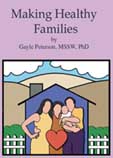Breaking Old Patterns of CommunicationTip sheet Excerpts
from Making
Healthy Families
|
Making Healthy Families explains the elements required to make and sustain healthy, functional families. This timely book describes the family life stages, from "Becoming a Couple," to "Becoming Parents," to "Raising Adolescents" and "Launching Children." It educates about the predictable stresses of each stage of development, and offers guidelines and hands-on exercises for achieving a healthy adjustment in each stage of family life. A chapter on “Trouble Shooting” offers couples an opportunity to plot their own predictable stress points on the family journey, thereby allowing them to better master their particular life struggles. A chapter on “Divorce: Crisis and Transformation” offers advice to parents for helping their children and themselves through trying times. A chapter on “Stepfamilies” provides wisdom about the stages of stepfamily development that make remarriage rewarding, helping families avoid the pitfalls that cause over half of second marriages to fail. Learn what makes families work—from structure and communication to family style and characteristics of healthy marital relationships. Cutting edge research is enlivened through real-life questions about marriage, family, and parenting that have been answered by Dr. Peterson Review: What Readers are Saying: "Your advice column is really terrific. The stepfamily and divorce articles are helping me a lot!" -Ann "Congratulations on the wonderful job you are doing on the web. I have been following your responses to the many questions people ask you and I think that your answers are intelligent and wise. I am learning so much!” -Adriana |
The askdrgayle.com service area is designed for educational
purposes only. You should not rely on this information
as a substitute for personal medical or mental health
attention, diagnosis or treatment. If you are concerned
about your health or that of a child's, please consult
your family's health care provider immediately.
Disclaimer:
The accuracy or completeness of any information contained
on this site is not guaranteed. As such, the columnist
is not responsible for any errors or omissions or for
the results obtained from the use of such information.
The author of such articles shall not be liable or responsible
to any person or entity for any loss or damage caused,
or alleged to have been caused, directly or indirectly
by the information or ideas contained, suggested, or
referenced on this site.
Return to Dr. Gayle Peterson's Home Page
Copyright 1996-2003. Gayle Peterson All rights reserved.
Send Comments and Inquiries to Dr. Gayle Peterson at gp@askdrgayle.com
